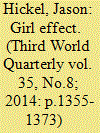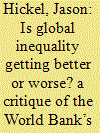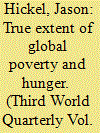| Srl | Item |
| 1 |
ID:
134393


|
|
|
|
|
| Summary/Abstract |
The ‘girl effect’ – the idea that investment in the skills and labour of young women is the key to stimulating economic growth and reducing poverty in the global South – has recently become a key development strategy of the World Bank, the imf, usaid and dfid, in partnership with corporations such as Nike and Goldman Sachs. This paper examines the logic of this discourse and its stance towards kinship in the global South, situating it within the broader rise of ‘gender equality’ and ‘women’s empowerment’ as development objectives over the past two decades. Empowerment discourse, and the ‘capability’ approach on which it is based, has become popular because it taps into ideals of individual freedom that are central to the Western liberal tradition. But this project shifts attention away from more substantive drivers of poverty – structural adjustment, debt, tax evasion, labour exploitation, financial crisis, etc – as it casts blame for underdevelopment on local forms of personhood and kinship. As a result, women and girls are made to bear the responsibility for bootstrapping themselves out of poverty that is caused by external institutions – and often the very ones that purport to save them.
|
|
|
|
|
|
|
|
|
|
|
|
|
|
|
|
| 2 |
ID:
154787


|
|
|
|
|
| Summary/Abstract |
The dominant narrative of global income inequality is one of convergence. Recent high-profile publications by Branko Milanovic and the World Bank claim that the global Gini coefficient has declined since 1988, and that inter-country inequality has declined since 1960. But the convergence narrative relies on a misleading presentation of the data. It obscures the fact that convergence is driven mostly by China; it fails to acknowledge rising absolute inequality; and it ignores divergence between geopolitical regions. This paper suggests alternative measures that bring geopolitics back in by looking at the gap between the core and periphery of the world system. From this perspective, global inequality has tripled since 1960.
|
|
|
|
|
|
|
|
|
|
|
|
|
|
|
|
| 3 |
ID:
164028


|
|
|
|
|
| Summary/Abstract |
The safe and just space framework devised by Raworth calls for the world’s nations to achieve key minimum thresholds in social welfare while remaining within planetary boundaries. Using data on social and biophysical indicators provided by O’Neill et al., this paper argues that it is theoretically possible to achieve a good life for all within planetary boundaries in poor nations by building on existing exemplary models and by adopting fairer distributive policies. However, the additional biophysical pressure that this entails at a global level requires that rich nations dramatically reduce their biophysical footprints by 40–50%. Extant empirical studies suggest that this degree of reduction is unlikely to be achieved solely through efforts to decouple GDP growth from environmental impact, even under highly optimistic conditions. Therefore, for rich nations to fit within the boundaries of the safe and just space will require that they abandon growth as a policy objective and shift to post-capitalist economic models.
|
|
|
|
|
|
|
|
|
|
|
|
|
|
|
|
| 4 |
ID:
144263


|
|
|
|
|
| Summary/Abstract |
The final report on the Millennium Development Goals (MDGs) concludes that the project has been ‘the most successful anti-poverty movement in history’. Two key claims underpin this narrative: that global poverty has been cut in half, and global hunger nearly in half, since 1990. This good-news narrative has been touted by the United Nations and has been widely repeated by the media. But closer inspection reveals that the UN’s claims about poverty and hunger are misleading, and even intentionally inaccurate. The MDGs have used targeted statistical manipulation to make it seem as though the poverty and hunger trends have been improving when in fact they have worsened. In addition, the MDGs use definitions of poverty and hunger that dramatically underestimate the scale likely of these problems. In reality, around four billion people remain in poverty today, and around two billion remain hungry – more than ever before in history, and between two and four times what the UN would have us believe. The implications of this reality are profound. Worsening poverty and hunger trends indicate that our present model of development is not working and needs to be fundamentally rethought.
|
|
|
|
|
|
|
|
|
|
|
|
|
|
|
|